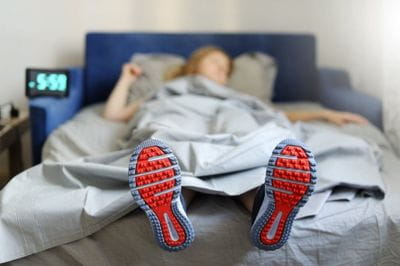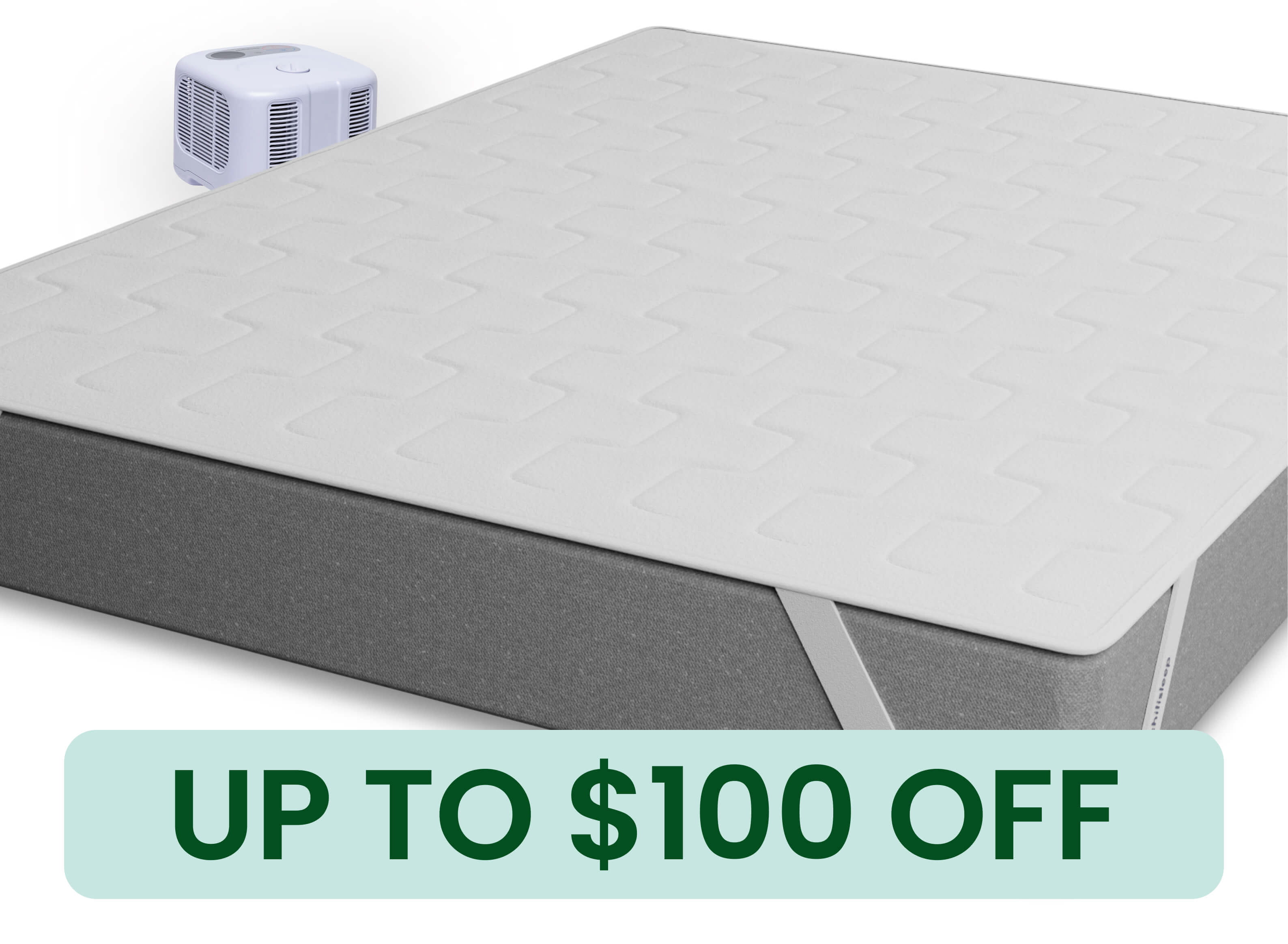
Maybe you're training for a marathon, a professional athlete, or you want to look better in a swimsuit!
It's been proven that a regular exercise, strength training, and a balanced diet are critical to a successful athlete. But did you know that sleep helps build muscles?
Sleep is critical for your want to get fit and build muscle.
When we're asleep, our body gets the required time to restore itself, giving us the energy to take on the day. Sleep can help develop muscles and help them recover properly, grow, and prevent illness. Sleep has plenty of benefits for elite athletes and everyone who is active.
Sleep Helps Your Muscles Recover
Muscle repair and growth occur during deep sleep. Our cooling mattress pads allow you to find the right temperature, ranging from 55-115º, to improve your deep sleep and wake up rested. Find out which sleep system is right for you.
Athletes often sleep hot. They sweat a lot at night—that has to do with metabolic activity being higher.
Dr. Chris Winter
Medical Director of the Martha Jefferson Sleep Medicine Center
How Muscles Grow
Let's take a look at the science behind muscle growth. Muscles grow through a process of hypertrophy. It's also explained as the enlargement of an organ or tissue from the increase in the size of its cells. For hypertrophy, must first be activated or stimulated.
This muscle growth happens when cells experience damage due to physical exertion. Exercise, whether running, lifting weights, or any other physical activity that puts your muscle cells under stress, activates your body to repair the damaged cells with growth hormone and protein synthesis. [1] These cause each damaged cell to become more significant to handle the physical demand.
Did You Know: Muscle hypertrophy happens when cells work to restore muscle fibers.
Deep Sleep and Muscle Growth
Muscle repair and development occur during deep sleep (REM sleep) due to the natural release of growth hormones. Studies show that humans release 70% of the hormone during deep sleep. The more deep sleep you get, the more you produce. [2]
Read More: How to Increase Deep Sleep
How Important is Sleep and Muscle Growth?
The math is straightforward. If more deep sleep equals more growth hormone, and more growth hormone equals bigger muscles, then more deep sleep equals bigger muscles!
Numerous studies indicate that optimized deep sleep improves physical performance by as much as 9% and enhances muscle recovery by as much as 30%. [3]
Did you know that poor sleep can significantly affect your athletic performance? Explore how sleep quality impacts sports abilities and overall physical performance.
Resource: Sleep, Recovery, and Athlete Performance [4]
How to Increase Sleep for Muscle Growth
Deep sleep is optimized when we sleep cold. Additionally, our bodies release more hormones when core temperatures are lowered.
Conversely, another study found any significant rises in core temperature resulted in complete inhibition of growth hormone release. [5]
Thus, not only does sleeping cold promotes muscle growth, but your tendency to “sleep hot” may work against you and your goals by interfering with building muscle.
Read More: Why Do I Get So Hot When I Sleep
Get Enough Sleep
Whether you're a professional athlete or looking to get in shape, getting anywhere between seven to nine hours of sleep each night is suggested. Sleep quality in athletes is associated with improving competitive success and overall performance.
Get More Deep Sleep
According to New Health Advisor, it can be difficult to wake you up in this sleep stage, and it's typical to feel disoriented for the first few minutes after waking up.
So, how many hours of deep sleep is recommended?
For individuals over 18 years old, it's recommended 1.5-1.8 hours of deep sleep—but you can't have too much!
Deep sleep repairs and restores your body for the next day. But why is this repair function so important? You can read our blog and learn more about how to increase deep sleep and its importance.
Create a Sleep Routine
Our bodies run on circadian rhythms, like internal clocks regulating mental and physical changes occurring in our bodies each day.
Similar to when you get hungry at the same time each day - right around lunchtime. Similarly, if you keep a consistent bedtime schedule, your body will start transmitting cues every night simultaneously, putting you into a deeper, more restorative sleep.
This isn't just for weekdays! It also means trying to keep the same sleep schedule for the weekends. Staying up on the weekends can alter your rhythms, making it harder to fall asleep during the week.
Good Sleep Hygiene
Practicing good hygiene is crucial for optimizing muscle growth and sleep recovery. This includes limiting the amount of electronic device usage leading up to bedtime. If possible, do the following:
- Turn off electronics 30–60 minutes before bed, helping limit blue light.
- Keeping your bedroom temperature cool.
- Block out unnecessary light that can affect your sleep.
- Use a white noise machine to help block out unwanted noise.

Relax with Yoga
We all know that yoga is good for you and offers plenty of benefits. But between cardio and strength training, it can be hard to find time for it. However, practicing a few poses before bed can improve sleep quality. Recent research has shown that practicing yoga improves sleep and can decrease levels of the stress hormone cortisol.
Did You Know: Yoga muscle building workouts can help improve flexibility and maintain lean body mass. [6]
Below are a few exercises sleepme offers to not only help with your overall health, but to improve your sleep.
- 3-minute Bedtime Yoga Routine
- 5-minute Outdoor Yoga Exercise
- 20-minute Yoga Midday Stretching Routine
Read More: Yoga Nidra for Sleep
Nutrition Building muscle requires good sleep, but nutrition plays a crucial role. Similar to creating a sleep routine, it's essential to maintain healthy eating habits as it can encourage healthy sleeping patterns. Eating a high-fiber diet with fresh vegetables, fruits, low-fat proteins (chicken & fish), and whole grains can help build muscle.
We all enjoy cookies, ice cream, and other sweets. But try to limit your intake or avoid consuming foods high in sugar when possible. Next time you're at the grocery store, search for foods high in B vitamins; B vitamins are thought to help regulate melatonin.
Read More: Foods That Help You Sleep
Sleep Cooler at Night
There are ways to ensure you sleep cold (no, they do not require cryogenic freezing)!
- Sleep with the thermostat set between 60-67.
- Make sure your bedding (sheets & pillowcases) is made from breathable cotton.
- Avoid synthetic fabrics like polyester for your bedding. They are more tightly woven and trap body heat. Also, foam mattresses can also trap heat.
- Wear breathable clothes when sleeping. Pajamas made from Bamboo naturally cool the skin.
- Use a bed cooling system such as the Chilipad Dock Pro or Chilipad Cube. They are 100% natural, fit on any bed, and allow you to control your bed temperature ranging from 55º to 115º F.
Read More: How to Sleep Cooler and the Many Benefits
If you explore these options, you’ll likely see an increase in your muscle growth and recovery and your overall mood and motivation so that you can keep training daily.
Citations/References
[1] Schoenfeld, Brad J The Mechanisms of Muscle Hypertrophy and Their Application to Resistance Training, Journal of Strength and Conditioning Research: October 2010 - Volume 24 - Issue 10 - p 2857-2872 doi: 10.1519/JSC.0b013e3181e840f3
[2] Van Cauter, E., & Plat, L. (1996). Physiology of growth hormone secretion during sleep. The Journal of pediatrics, 128(5 Pt 2), S32–S37. View Study
[3] Mah, C. D., Mah, K. E., Kezirian, E. J., & Dement, W. C. (2011). The effects of sleep extension on the athletic performance of collegiate basketball players. Sleep, 34(7), 943–950. View Study
[4] Bird, Stephen P. PhD, CSCS1,2 Sleep, Recovery, and Athletic Performance, Strength and Conditioning Journal: October 2013 - Volume 35 - Issue 5 - p 43-47 doi: 10.1519/SSC.0b013e3182a62e2f
[5] Christensen, S. E., Jørgensen, O. L., Møller, N., & Orskov, H. (1984). Characterization of growth hormone release in response to external heating. Comparison to exercise induced release. Acta endocrinologica, 107(3), 295–301. View Study
[6] Alsharif S, Ellis E. Resistance train to prevent muscle loss. Academy of Nutrition and Dietetics.






